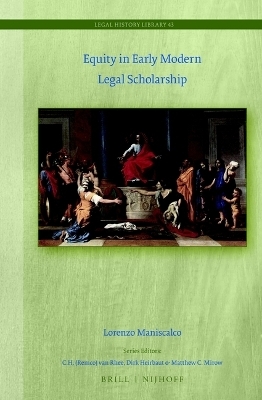
Equity in Early Modern Legal Scholarship
Martinus Nijhoff (Verlag)
978-90-04-40480-9 (ISBN)
Equity in Early Modern Legal Scholarship takes the reader through the vast amount of legal writings on equity that were published in continental Europe in early modern times. The book offers the first comprehensive overview of the development of the legal concept of equity through the sixteenth and seventeenth century. During this time, equity scholarship broke with its medieval past and entered a lively debate on the nature and function of the concept. Lorenzo Maniscalco links these developments to the early modern identification of equity with Aristotelian epieikeia, a conceptual shift that brought down the barrier that divided theological and legal writings on equity and led to its development as a tool for the interpretation and amendment of legal rules.
Lorenzo Maniscalco, Ph.D. (2018), is a Fellow in Law at Clare College, University of Cambridge.
Acknowledgments
Notes on the Text
Introduction
1 Background:Aequitas and Epieikeiain the Medieval Ius Commune
1.1 Aequitas in the Medieval Ius Commune
1.1.1 The Glossators: Ius Approbatum, Aequitas Constituta and Aequitas Rudis
1.1.2 Later Developments among Legists
1.1.3 Aequitas in Medieval Canon Law
1.1.3.1 Canonists and Misericordia
1.1.3.2 Canonists and the Aequitas of the Legists
1.1.3.3 Aequitas Canonica
1.1.4 The Use of Equity in Broader Context
1.1.4.1 Equity as a Principle of Interpretation
1.1.4.2 Proceeding and Judging ex Aequo et Bono
1.2 Aequitas as Epieikeia
1.2.1 Epieikeia in Scholastic Moral Theology
1.2.1.1 Epieikeia in Aquinas
1.2.1.2 Later Development of Epieikeia in Egidius Romanus and Johannes Gerson
1.2.2 The Influence of Moral Theology on Legists and Canonists
2 The Introduction and Diffusion of Epieikeia in Legal Scholarship
2.1 Introduction
2.2 The Introduction of Epieikeia in Legal Scholarship
2.2.1 Gulielmus Budaeus and the Introduction of Epieikeia in Legal Scholarship
2.2.2 Humanistic Aristotelianism: Leonardus Aretinus and Epieikeia as Aequum et Bonum
2.2.3 A New Approach to Aequitas
2.3 Aequitas in Legal Humanism I: Challenging the Medieval Orthodoxy
2.3.1 Marius Salamonius and Aequitas as Interpretation
2.3.1.1 What Equity as Epieikeia is
2.3.1.2 What Equity Does: Equitable Interpretation and Emendation
2.3.1.3 Concluding Remarks on Salamonius
2.3.2 Claudius Cantiuncula – Universal and Particular Equity
2.3.3 Lutheran Jurists on Equity
2.3.3.1 Philipp Melanchthon
2.3.3.2 Johannes Oldendorpius
2.3.4 The Consolidation of Salamonius’ Theory in Connanus and Duarenus
2.3.4.1 Aequitas as Interpretation in Connanus and Duarenus
2.3.4.2 Natural Equity and Civil Equity in Connanus and Duarenus
2.3.4.3 The Application of Interpretatio ex Aequo et Bono in Connanus and Duarenus
2.3.5 Concluding Remarks – Equity as Epieikeia among Early Legal Humanists
2.3.6 The Influence of Rhetorical Status Theory
2.4 Aequitas in Legal Humanism II: Reconciling Epieikeia with Aequitas Scripta
2.4.1 The Hazards of Equity
2.4.2 Challenging Budaeus
2.4.3 Reconciling Epieikeia with Aequitas Scripta
2.4.3.1 Udalricus Zasius and Aequitas Scripta as Civil Law
2.4.3.2 Aequitas Scripta as Written Epieikeia
2.5 The Diffusion of Equity as Epieikeia in Later Legal Scholarship
2.5.1 Legal Dictionaries
2.5.2 Civil Law
2.5.3 Canon Law
2.5.4 Surviving Plurality of Views
2.5.5 Aequitas Cerebrina – Decline of Equity in Later Sources?
2.5.6 Conclusion
3 Aequitas and Epieikeia among Early Modern Scholastic Writers
3.1 Introduction
3.2 The Theological Concept of Epieikeia
3.2.1 Epieikeia in Aquinas
3.2.1.1 Quaestio 96
3.2.1.2 Quaestio 120
3.2.1.3 Ambiguities in Aquinas’ Theory of Equity
3.2.2 Cajetan’s Commentary
3.3 The Approach of Sixteenth-century Thomist Theologians and Jurists
3.3.1 Development of the Early Modern Theological Concept of Equity: Dominicus de Soto
3.3.1.1 Soto’s Concept of Equity
3.3.1.2 Equity and Interpretation in Soto
3.3.1.3 Soto and the Sixteenth-century Theological Concept of Equity
3.3.2 The Impact of the Legal Concept of Equity on Theologians Writing Legal Works
3.3.2.1 Martin de Azpilcueta
3.3.2.2 Didacus de Covarrubias
3.3.2.3 Later Examples – Luis de Molina (d. 1600) and Miguel Bartolomé Salon
3.3.2.4 Salamonius’ Equity and Theologians
4 The Place of Equity within Doctrines of Interpretation
4.1 Introduction
4.2 The Development of the Concept of Equity in Later Civil Law
4.2.1 Bringing Together Medieval Interpretation, Humanist Equity, and Late-scholastic Theology
4.2.2 Linking Equity and Interpretation I: Albertus Bolognetus – Interpretatio ex Aequo et Bono as a General Category of Interpretation Beyond the Letter
4.2.2.1 Equitable Intervention in Bolognetus
4.2.2.2 The Scope of Equity - C.3.1.8 and C.1.14.1
4.2.2.3 Ius Commune Rules of Interpretation as Interpretatio ex Aequo et Bono
4.2.2.4 The Influence of Epieikeia Theory in Bolognetus
4.2.3 Linking Equity and Interpretation II: The Influence of Scholastic Theology – Interpretatio ex Aequo et Bono as a Correction or Interpretation of the Law to Avoid Injustice
4.2.3.1 Introduction
4.2.3.2 Mendoza and Turaminus – Equity as a Restrictive Correction of the Law
4.2.3.3 Hugo Donellus – Equity’s Place in the Structure of Interpretation
4.2.3.4 Hugo Grotius’ de Aequitate, Indulgentia et Facilitate – An Entirely Theological Account of Equity
4.2.4 Linking Equity and Interpretation III: Suarez and the Seventeenth-century Development of Theological Epieikeia as Interpretation
4.2.4.1 Franciscus Suarez
4.2.4.2 The Influence of Suarez on Later Theologians
4.3 Legacy – A Specific Role for Equitable Interpretation?
4.3.1 Later Civil Lawyers
4.3.1.1 General Civil Law Commentaries
4.3.1.2 The Case of Treatises on Interpretation
4.3.2 Later Canon Lawyers
Conclusion
Works Cited
Index
| Erscheinungsdatum | 27.07.2020 |
|---|---|
| Reihe/Serie | Legal History Library ; 43 |
| Sprache | englisch |
| Maße | 155 x 235 mm |
| Gewicht | 504 g |
| Themenwelt | Geschichte ► Allgemeine Geschichte ► Mittelalter |
| Geschichte ► Allgemeine Geschichte ► Neuzeit (bis 1918) | |
| Geschichte ► Teilgebiete der Geschichte ► Militärgeschichte | |
| Recht / Steuern ► Rechtsgeschichte | |
| ISBN-10 | 90-04-40480-5 / 9004404805 |
| ISBN-13 | 978-90-04-40480-9 / 9789004404809 |
| Zustand | Neuware |
| Informationen gemäß Produktsicherheitsverordnung (GPSR) | |
| Haben Sie eine Frage zum Produkt? |
aus dem Bereich


